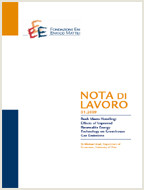Long-term Transport Energy Demand and Climate Policy: Alternative Visions on Transport Decarbonization in Energy Economy Models

12.01.2013
Robert Pietzcker, Thomas Longden, Wenying Chen, Sha Fu, Elmar Kriegler, Page Kyle, Gunnar Luderer
Q54, R41, R48
Transportation Scenarios, Carbon Emission Mitigation, Integrated Assessment, Energy-Economy Modeling, Advanced Light Duty Vehicles, Demand Reduction
Climate Change and Sustainable Development
Carlo Carraro
Transportation accounts for a substantial share of CO2 emissions, and decarbonizing transport will be necessary to limit global warming to below 2°C. Due to persistent reliance on fossil fuels, it is posited that transport is more difficult to decarbonize than other sectors. We test this hypothesis by comparing long-term transport energy demand and emission projections for China, USA and the World from five large-scale energy-economy models with respect to three climate policies. We systematically analyze mitigation levers along the chain of causality from mobility to emissions, and discuss structural differences between mitigation in transport and non-transport sectors. We can confirm the hypothesis that transport is difficult to decarbonize with purely monetary signals when looking at the period before 2070. In the long run, however, the three global models achieve deep transport emission reductions by >90% through the use of advanced vehicle technologies and carbon-free primary energy; especially biomass with CCS plays a crucial role. Compared to the global models, the two partial-equilibrium models are relatively inflexible in their reaction to climate policies. Across all models, transportation mitigation lags behind non-transport mitigation by 10-30 years. The extent to which earlier mitigation is possible strongly depends on implemented technologies and model structure.
***
Suggested citation: Robert C. Pietzcker, Thomas Longden, Wenying Chen, Sha Fu, Elmar Kriegler, Page Kyle, Gunnar Luderer, Long-term transport energy demand and climate policy: Alternative visions on transport decarbonization in energy-economy models, Energy, Volume 64, 1 January 2014, Pages 95-108, ISSN 0360-5442, http://dx.doi.org/10.1016/j.energy.2013.08.059.
